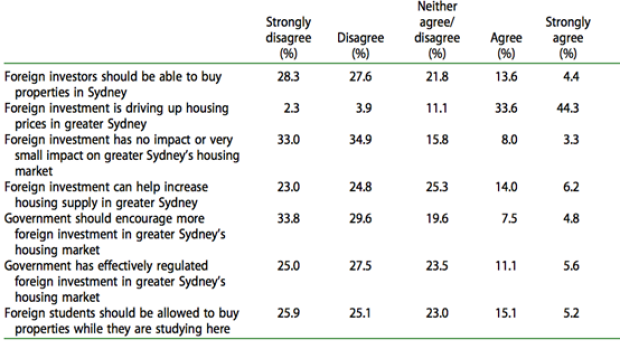The majority of Sydneysiders don’t believe foreign investors should be allowed to buy Australian property, despite experts claiming little evidence exists showing offshore buyers pushing up prices.
A new study into attitudes towards foreign investors, spearheaded by University of Sydney housing researcher Dallas Rogers, surveyed 900 Greater Sydney residents in November 2015 and was released on Wednesday after being published in the Journal of the Australian Geographer.
When asked if foreign investors should be able to buy properties in Sydney, 28.3 per cent of respondents said they “strongly disagree” while 27.6 per cent said they “disagree”. A further 21.8 per cent were on the fence.
A total of 4.4 per cent “strongly agree” they should be allowed.
Most locals also did not agree that foreign investment increased property supply.
And 64 per cent believed foreign investment was the main reason property prices had risen, followed by the drivers of low interest rates, planning issues and local investors.
This was despite there being little solid information about foreign investment when the research was undertaken.
“Despite no hard data they still had very strong views on the topic,” Dr Rogers said.
There was also a strong correlation between anti-multiculturalism and those who were anti-foreign investment.
“There’s not a lot of support for foreign investment at the ground level.
“The recent federal budget saw the government come down hard on foreign investors, which demonstrates the dilemma that the government is facing as it attempts to manage foreign investment alongside a disenchanted Australian public.”
There has long been a debate about the exact proportion of the property market bought by foreign buyers, but Chinese investment in Australian real estate in particular has more than doubled in recent years.
The majority surveyed also thought Chinese investors specifically were mainly in the “super rich” category, despite National Australia Bank research indicating the majority of foreign investment is in the sub-$1 million category.
Shane Oliver, from AMP Capital, said the response was similar to when Australians are asked whether they want immigration: “Often they say no … but policymakers continue to allow it.”
Banning foreign buyers would have a “negative impact” on the market and could see apartment prices fall by up to 30 per cent, he warned.
“Prices would come down quite substantially, which would be bad for 65 per cent of Sydneysiders who own outright or with a mortgage,” Dr Oliver said.
“If you’re a first-home buyer this could be good … but a huge price fall invariably comes with a recession, which includes higher unemployment.”
Founder of off-the-plan global sales platform Investorist, Jon Ellis, has had success entering into the Chinese market and runs a report into this buying segment every year.
He warned any widespread ban on foreign investment would come with “shockwaves” for the property market.
“Foreign buyers increase supply, which increases affordability,” Mr Ellis said.
“Australians love scapegoating – first they were blaming Baby Boomers … now they’re blaming Chinese people. It’s not racism but it is xenophobia,” he said.
Chinese international property portal Juwai chief executive, Charles Pittar, agreed and said it was “easier” to blame foreign buyers than to tackle tax policy and negative gearing.
“Foreign investment is going right where Australia wants it – into funding new housing supply. It is creating jobs, tax revenue and economic growth and – in fact – it is one of the few bright spots of the economy,” Mr Pittar said.
Esther Yong, director of Chinese-language Australian property site ACProperty and Chinese portal Sodichan, also believed foreign investors helped boost supply, the construction industry, employment and, indirectly, tourism.
She said it would be a “worry” when foreign buyers were no longer interested in local real estate.
This article was originally published by Jennifer Duke, 17 May 2017 via domain.com.au

